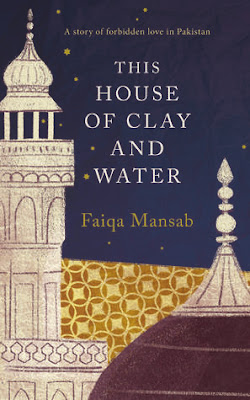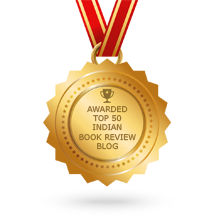My rating: 5 of 5 stars
“But you can only lie about who you are for so long without going crazy.”
----Ellen Wittlinger
Faiqa Mansab, a Pakistani author, has penned an extremely evocative contemporary fiction called, This House of Clay and Waterthat revolves around two women and one transgender searching for love, freedom and identity, set against the repressed yet exquisite backdrop of the city of gardens, Lahore. One is chained and married to a man of extreme political power in a loveless marriage, while the other is a feminist and is destined to be with a man with whom she can't explore her sexual desires and passion and then there's this transgender who knows that God almighty has made him the way he is destined to be and that he must find his love in Allah only, but their lives forever changes when they meet at a dargah (Mosque) and gradually a forbidden relationship begins to blossom under the holy roofs of that dargah.
Synopsis:
Set in Lahore, This House of Clay and Water explores the lives of two women. Nida, intelligent and lonely, has married into an affluent political family and is desperately searching for some meaning in her existence; and impulsive, lovely Sasha, from the ordinary middle-class, whose longing for designer labels and upmarket places is so frantic that she willingly consorts with rich men who can provide them. Nida and Sasha meet at the famous Daata Sahib dargah and connect-their need to understand why their worlds feel so alien and empty, bringing them together.
On her frequent visits to the dargah, Nida meets the gentle, flute-playing hijra Bhanggi, who sits under a bargadh tree and yearns for acceptance and affection, but is invariably shunned. A friendship-fragile, tentative and tender-develops between the two, both exiles within their own lives; but it flies in the face of all convention and cannot be allowed.
Faiqa Mansab's accomplished and dazzling debut novel explores the themes of love, betrayal and loss in the complex, changing world of today's Pakistan.
Nida, the calm, sharp and unloved housewife to a powerful politician in Lahore, is leading a sad, monotonous and often painful married life since the death of her little girl, until she meets Sasha. Sasha, the impetuous and gorgeous housewife to a considerate and understanding businessman, is leading a boring and sex-less marriage with two daughters, but she knows how to quench the thirst for her sexual hunger but once she meets Nida, she questions her infidel and sinful actions to make herself happy. And under the roofs of dargah where these two polar opposite ladies meet for the first time, a bond of friendship and sister hood is immediately formed. Until Nida meets and falls for the homeless transgender, Bhanggi. Bhanggi, an outcast transgender of the society, sits under a tree in the dargah and plays his flute to lure the kind souls, while questioning Allah's ways of showing love to his loyal followers like him, until he meets and falls for Nida. A friendship is immediately struck between the two, followed by their intimate and soulful connection, that develop into something deeper and beautiful, away from the prying and questioning eyes of the judgmental society. Can the friendship survive between Nida and Bhanggi? And what role does Sasha plays in the life of these two? Grab a copy of this book now to find out more.
One of the best books I have read that is written by a Pakistani author till date and trust me, this story is going to stay with me for a very, very long time. This is the kind of story that makes an impact and long after the story has ended, it will hit you right in your head and heart when you're sitting idle and thinking nothing objective. But I wouldn't compare this to Hosseini's The Kite Runner, as this doesn't have those important and right elements to be an extraordinary book like Hosseini's. nevertheless, this story has apt amount of layers and elements to be a very redolent story about friendship and love beyond labels and society's definitions.
The writing style of the author is coherent, laced with deep, moving emotions, that is bound to captivate the readers with the story line. The narrative style of the story line is beautiful, thought provoking and extremely compelling enough to keep the readers glued to the pages of this book. Not only that, the dialogues are heavily layered with myriad of emotions that will sometimes make the readers feel joyous or sad depending upon the characters' plight. The pacing is quite swift, as the story turns a heart breaking and unforeseeable climax through unpredictable twists and turns.
The description of Lahore, the city of gardens, is vividly done by the author. The author has successfully painted the true portrait of a contemporary Lahore, which may look very modern from the outside, but from the inside, it is still holding tightly on to its narrow minded society dominated ideals and customs. The essence of Lahore is heavily felt through the pages of this book, as the author strikingly projects the daily hum drum and the lives of the common folks of Lahore, through their routines, customs, religion, job, desires, dreams, ambitions, and their general lifestyle and their outlook towards life. The author has bring alive this garden city through her elegant and exquisite words rich with Urdu proverbs. The author has not only portrayed the beauty of Lahore, but has also shed light on the darker aspects of a so-called progressive society, that still keeps their women behind the veil. Also religion plays an important role in this book in a very positive manner.
The characters are simply fantastic, in just one word, I have never met anyone like them in real life, but I'm sure that characters like Nida, Sasha and Bhanggi exists in the daily life whose simple, down-to-earth and eccentric faces are hidden in the crowd. All three of the characters is far beyond perfection, heavily flawed, make mistakes, keep secrets, break laws and rules and are courageous. Only thing that makes them different is that they are brave enough to run after their heart's desires even in a society that has shunned hermaphrodites (a hijra) and considered them to be a curse of the society. The love story between Nida and Bhanggi is not profound, according to me, its highly liberating and profound and will give hope to those who think that they don't deserve love since they are different and an outcast in a society. The relationship between the three is so much enriching that it is bound to enlighten souls beyond borders and religious indifferences. The three protagonists' approach towards life is worth a read for one and all.
Overcoming fear is one thing, but overcoming the facades of societal duties and labels to find the true happiness and love is perfectly depicted by the author in this book. Highly recommended for the contemporary and literary fiction fans.
Verdict: A highly emotional and engrossing read!
Courtesy: Thanks to my friend, Deepti for the book.
---------------------------------------------------------------------------------------------------
Author Info:
My stories arise from discontent, disenfranchisement, the periphery. Mainly because I’ve grown up in a country that refuses to accept its own plurality, is determined to forget its history even as it flounders on the brink of self-destruction. I internalized the subliminal conflicts of daily life wrought with issues that should be clichés but were my reality: patriarchy, lack of opportunity and gender discrimination. I, as an individual—woman, thinker, writer—was at odds with the limiting and reductive social constructs of my culture. And I read and wrote to make sense of everything around me.
Being an educated woman; being a writer, and writing in English particularly, make me a minority, and these realities have pushed me to resist labels, categories, and monolithic ideologies, in life and so perhaps my very identity is a site of resistance. How can I not write?
I’m a product of the textual multi-verse. Stories are my home, and literatures in Urdu, Punjabi, English, as well as translated literature from around the world, have informed my intellectual landscape.
Writing was not a conscious choice. I write in English but my diction is steeped in cultures, languages and literatures that are not English. I feel privileged to have a voice with multiple and multifarious echoes that coalesce together to form new patterns. I have to write to stay in touch with who I am. I am most myself when I write.
Visit her here
Book Purchase Links:







This article provides an in-depth guide to those wishing to write a full-length novel, particularly the new author. It discusses such topics as the Novel Within, Readership, Novel Writing, Plot Possibilities, Novel Structure, Outlines, Narrative Voice, the Protagonist, the Antagonist, Conflict, Crisis, and Stakes, Motivations, Plots, Scenes, Setting, Action, Summary, Dialogue, Feelings and Thoughts, and Background. Tipnovel.com
ReplyDelete